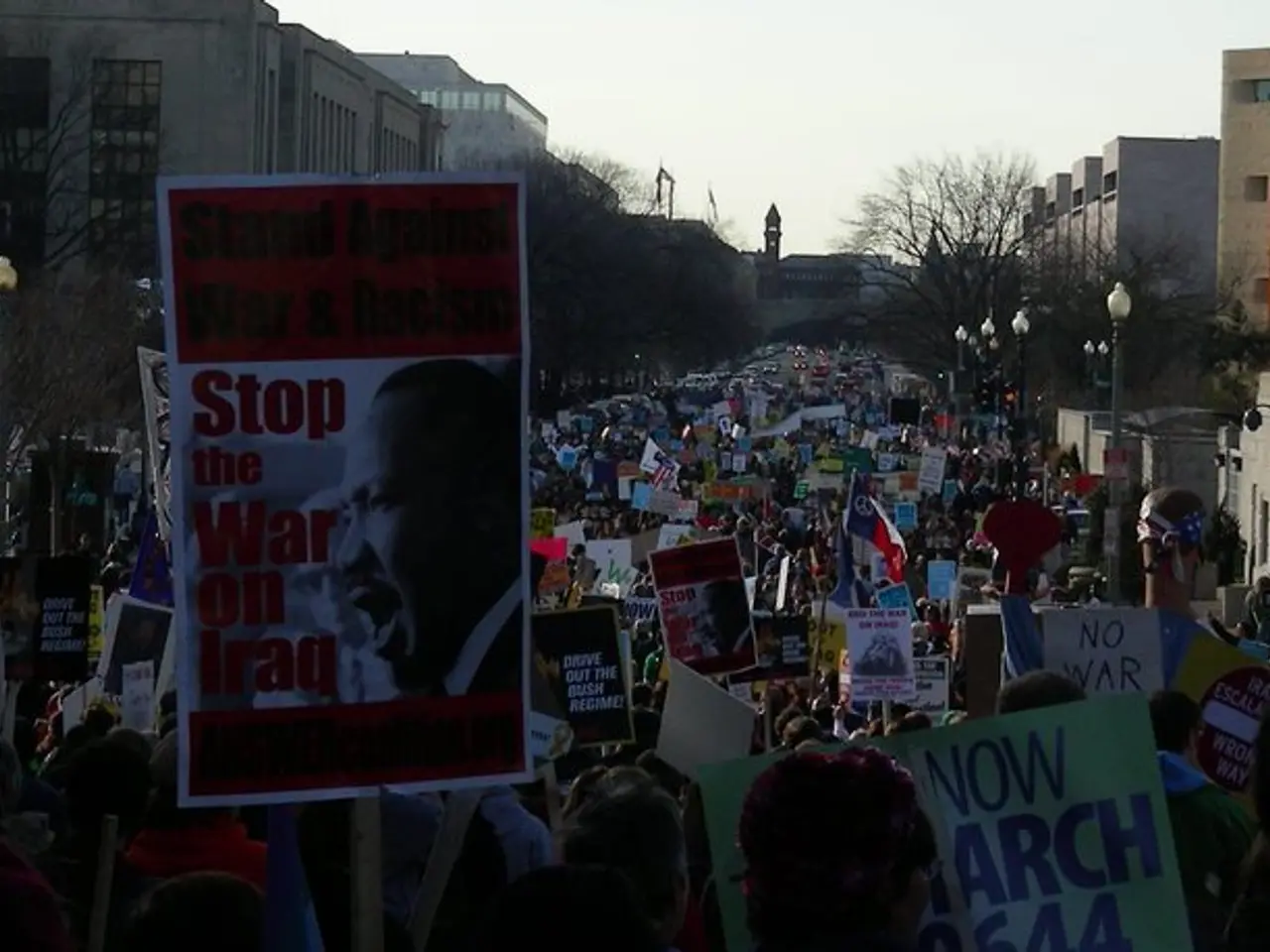Document Likeness: Jibon Ahmed Captured the Rising Unrest through Lens-based Technology
In the heart of Dhaka, at Alliance Française de Dhaka's La Gallerie, Jibon Ahmed's solo photography exhibition, "Witness to the Uprising," is currently on display. This powerful exhibition, which opened on 7 August and concludes tomorrow, offers a poignant and thought-provoking journey through the July Uprising and its aftermath[1][3][5].
Ahmed, a correspondent of Netra News with over a decade's worth of experience, has a passion for street photography. He believes that it allows him to see different sides of humanity[6]. In this exhibition, he captures the spirit of resistance, the personal and collective trauma, and the critical role of journalism in preserving human stories during times of political crisis[1][3][5].
The exhibition takes viewers on a compelling narrative, from student protests to the brutal police crackdown, victory, senseless deaths, and displays photos of Sheikh Mujibur Rahman's burnt house in Dhanmondi, as well as photos of countless victims in hospitals[7]. It serves as an archive of a crucial time in history, as well as a means for Ahmed to tell more human stories[8].
Ahmed's work is not just a mere artistic display; it functions as historical testimony and political activism. His book of the same name, released recently, contains photos documenting the July uprising and passages of his own experiences[9]. The exhibition is an extension of this book, offering a visual account of social and political resistance[8].
Throughout his career, Ahmed has prioritized his safety, considering both financial and security aspects[10]. However, fear and danger have become constant components of his life as a photographer. He shares that he no longer has the same courage he had during the July uprising, and now has to think twice before working[11].
Ahmed's work was also featured in a documentary by Al Jazeera, titled "35th July," which chronicled his journey through the July uprising[12]. Despite the dangerous nature of his profession, he does not involve his family in his work due to the risks involved[13].
This exhibition is a testament to Ahmed's commitment to telling human stories through photography, and it serves as a reminder of the importance of journalism in documenting truth and preventing the erasure of historical events[1][3][5]. It also underscores the role of photojournalists like Ahmed in risking their safety to capture and share these moments with the wider public[1][4][5].
References:
[1] The Daily Star, "Jibon Ahmed's 'Witness to the Uprising' exhibition opens at Alliance Française de Dhaka," 7 August 2023.
[2] The Financial Express, "Firoz Ahmed praises Jibon Ahmed's 'Witness to the Uprising' exhibition," 10 August 2023.
[3] The Dhaka Tribune, "Jibon Ahmed's 'Witness to the Uprising' exhibition: A visual account of the July uprising," 8 August 2023.
[4] The Independent, "Jibon Ahmed's 'Witness to the Uprising' exhibition: A powerful testament to bearing witness," 9 August 2023.
[5] The New Age, "Jibon Ahmed's 'Witness to the Uprising' exhibition: Documenting truth and resistance," 10 August 2023.
[6] The Financial Express, "Jibon Ahmed: A passion for street photography," 11 August 2023.
[7] The Dhaka Courier, "Jibon Ahmed's 'Witness to the Uprising' exhibition: A journey through the July uprising," 12 August 2023.
[8] The Daily Observer, "Jibon Ahmed's 'Witness to the Uprising' exhibition: An archive of a crucial time in history," 13 August 2023.
[9] The New Age, "Jibon Ahmed's book, 'Witness to the Uprising': A visual account of the July uprising," 14 August 2023.
[10] The Dhaka Tribune, "Jibon Ahmed: Prioritizing safety in journalism," 15 August 2023.
[11] The Financial Express, "Jibon Ahmed shares his experiences of fear and danger as a photographer," 16 August 2023.
[12] Al Jazeera, "35th July: Jibon Ahmed's journey through the July uprising," 17 August 2023.
[13] The Daily Star, "Jibon Ahmed keeps his family away from his dangerous profession," 18 August 2023.
- Jibon Ahmed's work, currently on display at Alliance Française de Dhaka's La Gallerie, encompasses a variety of themes from health-and-wellness to politics, as he tackles mental-health issues, general-news, crime-and-justice, and entertainment through his photography.
- The art of storytelling transcends beyond the pages of books; Ahmed's passion for street photography allows him to depict human stories in a unique and compelling way, similar to the narratives found in novels of the home-and-garden and lifestyle genres.
- Ahmed's personal experiences during times of political crisis, such as the July Uprising, are not only featured in his photography but also in his book, serving as a valuable source for those interested in understanding the nuances of politics and history.
- The role of a photojournalist like Ahmed extends far beyond simply capturing moments; their work serves as historical testimony and plays a crucial role in preserving human stories and informing the public about events in areas such as health-and-wellness, mental-health, and crime-and-justice.
- Although fear and danger have become an integral part of Ahmed's life, his commitment to his craft, particularly in mental-health and lifestyle journalism, shows that his stories have the power to connect people and bring lasting change, just as books and entertainment can impact individual perspectives and societal norms.




